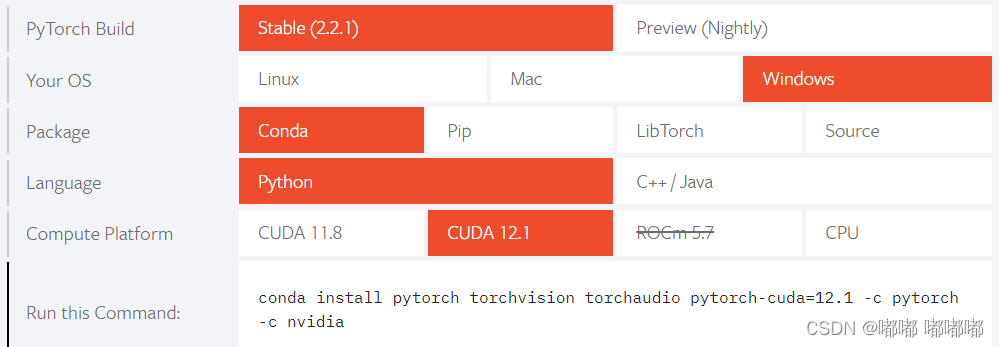- 1【并发编程四】windows进程通信和Linux进程通信_windows linux消息队列,用于进程间消息同步
- 2电子班牌解决方案-最新全套文件_电子班牌系统施工方案
- 3redis,memcache二者的区别比较及redis应用场景_memcache和redis的区别和应用场景
- 4Javase-初识Java
- 5私有GitLab仓库 - 本地搭建GitLab私有代码仓库并随时远程访问「内网穿透」_gitlab私有部署
- 6Java中Map高效率遍历的方式_map遍历效率最高
- 7Redis分布式缓存
- 8【论文阅读】VMamba:视觉状态空间模型_visual mamba块(vss)
- 9樊政谈人才职场成功最重要的53句话_详细可行的职业生涯规划是人才成功的基石是谁说的
- 10libtest (native:platform) should not link to libmi3 (native:vendor)_(native:platform) can not link against libdiag (na
easyocr和paddleocr的简单使用与对比
赞
踩
这次有个OCR的需求,对比了一下easyocr和paddleocr的识别效果,最终选择了paddleocr。
这里记录一下使用过程和遇到的问题。
easyocr
安装
使用easyocr前,需要先安装torch和torchvision

如果使用GPU的话,还需要先安装CUDA,可常见这位大佬的文章,写得很详细:https://blog.csdn.net/AI_dataloads/article/details/133043869
CUDA和pytorch安装好后,再pip install easyocr
简单使用
import easyocr
image = r"D:\tmp\test\1.PNG"
reader = easyocr.Reader(['ch_sim', 'en'])
result = reader.readtext(image, detail=0)
print(result)
- 1
- 2
- 3
- 4
- 5
遇到的问题
- 安装torch的时候,使用conda安装比pip安装,快了不知道多少倍!!!一开始使用pip安装等得花儿都谢了
- 对比了一下,同一张图片,使用GPU的识别速度比使用CPU快2.4倍左右
- 如果报错
ImportError: cannot import name 'model_urls' from 'torchvision.models.vgg',那就是easyocr和torchvision的版本差异问题(我当时使用的版本:easyocr=1.7.1,torch=2.2.1,torchvision=0.17.1) - 如果报错
can't open/read file: check file path/integrity....AttributeError: 'NoneType' object has no attribute 'shape'那就是图片路径出现中文了,不要有中文路径
图片越大,OCR耗时越长,如果你只需要识别图片特定部分,可以先把图片裁剪了,减少识别区域,加快OCR识别速度(我当时的需求,只需要识别图片上半部分,于是就将上半张图片另存为新图。识别半张图比完整图快2.6倍)
将上半张图另存为新图的代码:
def split_image_vertically_get_upper_part(image_path) -> str:
# 将图片分为上下2半,将上半张图片保存为新文件,并返回路径
img = Image.open(image_path)
width, height = img.size
split_point_y = height // 2
top_img = img.crop((0, 0, width, split_point_y))
# 保存上半部分图片 保存到同级目录
dir_path, filename_with_suffix = os.path.split(image_path)
filename, suffix = os.path.splitext(filename_with_suffix)
new_path = os.path.join(dir_path, f'{filename}_top{suffix}')
top_img.save(new_path)
return new_path
- 1
- 2
- 3
- 4
- 5
- 6
- 7
- 8
- 9
- 10
- 11
- 12
使用效果
英文图片识别:

中文图片识别:

目前看起来一切正常,挺满意的。但是,一旦图片变大一点,字体变小一点,中文识别就有问题了(大图小字英文图片 我没试过)。下图是这次要识别的图片,图大字小,为了数据脱敏,只截取了几个片段:

没办法,只能换一个OCR库,于是转向了paddleocr
paddleocr
安装
使用paddleocr,需要先安装paddlepaddle:
如果使用GPU 也需要先安装CUDA(安装方式见上文),然后pip install paddlepaddle-gpu -i https://mirror.baidu.com/pypi/simple
如果使用CPU:pip install paddlepaddle -i https://mirror.baidu.com/pypi/simple
再pip install "paddleocr>=2.0.1"
遇到的问题
我目前使用的版本:paddleocr=2.7.0.3, paddlepaddle-gpu=2.6.0。貌似这俩对CUDA的版本要求是<=11,而我在上面体验easyocr到时候已经安装了最新版的12.2,真是造化弄人啊。我不想卸载CUDA重新安装,太麻烦了,先直接运行看看能不能跑
结果一堆报错,说缺少动态连接文件,比如Could not locate cudnn_cnn_infer64_8.dll. Please make sure it is in your library path!
这种版本不匹配的情况,通常只能推倒重来,但我使用了另一种偏方:
我用everything搜索缺的那个动态链接库cudnn_cnn_infer64_8.dll,结果在上面easyocr的环境中找到了 笑哭.gif。于是它报缺什么dll,我就从anaconda\envs\torchocr2\Lib\site-packages\torch\lib easyocr的虚拟环境中找到复制到anaconda\envs\paddle_env\Lib\site-packages\paddle\libs 中去
最后还报了却一个cublas64_11.dll 但是我只在CUDA的安装目录C:\Program Files\NVIDIA GPU Computing Toolkit\CUDA\v12.2\bin 中找到了cublas64_12.dll ,但是版本不匹配呀,怎么搞?我又用了个偏方把cublas64_12.dll 复制到anaconda\envs\paddle_env\Lib\site-packages\paddle\libs 把12改成11,骗一下它,看看行不行,结果还真骗过去了 再次笑哭.gif
简单使用
from paddleocr import PaddleOCR
image2 = r"D:\tmp\test\1.PNG"
ocr = PaddleOCR(use_angle_cls=False, lang="ch")
result = ocr.ocr(image2, cls=False)
content_list=[]
for idx in range(len(result)):
res = result[idx]
for line in res:
content_list.append(line[-1][0])
content=''.join(content_list)
print(content)
- 1
- 2
- 3
- 4
- 5
- 6
- 7
- 8
- 9
- 10
- 11
- 12
使用效果
很好,超出预期,上面easyocr未识别出来的,paddleocr全部识别出来了,中文OCR还得是国产强。
我那大图小字的图片不好脱敏,就不贴图了。
唯一的缺点就是 i j l 0 o 这些识别可能不准确。但是情有可原,已经非常棒了。
2个OCR库该有的功能都有,比如识别出的文字坐标, 准确率 等.本文只是基于我的需求,测了文字提取,更多其他功能,各位自行去查阅官方文档


